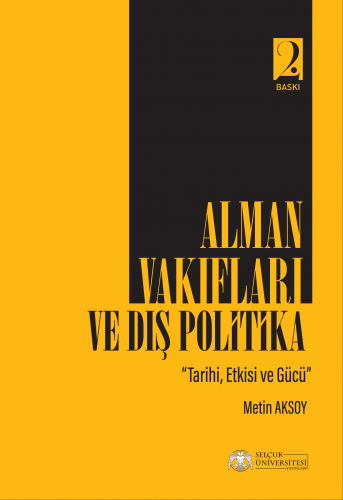
German Foundations and Foreign Policy “History, Influence and Power”
Synopsis
A defining feature of the post-Cold War era, marked by the dissolution of old power dynamics and the reshaping of global politics, is the proliferation of issues and actors in international affairs. From human rights and environmental concerns to identity and migration, terrorism to humanitarian security, a diverse array of new players have emerged on the world stage. Human rights organizations, environmental groups, local communities, and multinational corporations, all organized around broad agendas and shared interests, actively participate in international politics, shaping decision-making processes and implementing outcomes. This evolving landscape makes it increasingly challenging to explain today's foreign policies as closed, one-dimensional processes confined solely within the walls of nation-states. Globalization has fostered unprecedented interactions across political, economic, cultural, artistic, communicative, and transportation spheres, resulting in societies mutually influencing and being influenced by one another. As a consequence, foreign policy has undergone a profound transformation, evolving into a complex network of multiple actors and dimensions, with horizontal connections among diverse communities. Moreover, the accessibility of propaganda tools on social media platforms has become widespread, amplifying their impact and effectiveness. This paradigm shift in the modern era has enhanced the potency and efficacy of soft power instruments.
Among these tools of soft power, non-governmental organizations (NGOs) hold a prominent position. Leveraging transnational communication channels, they possess the ability to exert direct pressure on governments and business magnates, urging them to recalibrate their policies. Moreover, NGOs skillfully navigate the realm of public opinion, subtly shaping it to align with their own agenda. It is within this landscape that speculations arise, suggesting that developed nations employ NGOs as covert instruments to meddle in the internal affairs of developing countries. The very existence of such assumptions finds its grounding in the symbiotic relationship between NGOs and the financial support they receive from affluent nations and multinational corporations. A noteworthy case in point is Germany, whose substantial funding towards foundations further lends credence to these conjectures.
After Germany's post-war revival in 1949, it embarked on a distinct path in international politics, abandoning its former "Realpolitik" approach and embracing a foreign policy ethos grounded in the aspiration to never resort to aggressive warfare. Germany of this novel approach, dubbed "Zivilmacht" or "civil power," sought to foster cooperation with democratic nations and collaborate with international organizations on a global scale, contrary to the Realpolitik of the past which viewed states cooperating with one another genuinely as unfeasible. The aforementioned change in foreign policy understanding has brought about an effort by politically affiliated foundations or personal organizations to act as shaping forces, aiming to increase their activities in various regions. In the modern landscape, German foundations wield the power to sway political figures and guide public sentiment, effectively influencing Germany's foreign policy agenda. Simultaneously, the German government maintains a close rapport with these foundations as it executes its foreign policy, extending its reach beyond national borders. Consequently, these activities not only establish German foundations as significant actors in international affairs but also illuminate their role as partners to the German government in the pursuit of a foreign policy anchored in the principles of non-aggression, peace preservation, democratic proliferation, and economic collaboration. Throughout the early 2000s, the escalating financial resources of politically affiliated foundations have amplified their influence within Germany's foreign policy domain, accentuating their significance as key players. However, as German foundations facilitate the global dissemination of Germany's political values and cultural distinctiveness, they occasionally encounter clashes of interest with the policies of host countries, sowing seeds of a potential conflict.
In this context, German foundations, operating with different agendas and initiatives in each country, have become a subject of contentious debates surrounding their disregard for the sensitivities of the nations they engage with. While some of these discussions remain confined to the court of public opinion, others have found their way into legal proceedings. Seeking to break free from the historical impasse of Israel-centric policies in the Middle East, Germany endeavors to bolster its soft power through foundations. Yet, the funds provided by German foundations to local counterparts in Israel have become a source of contention. Similarly, in pre-coup Egypt, the activities of German foundations reached levels that stirred public unease, leading to court battles over illicit foreign financing. Beyond Egypt, Russia, with its historically complex relationship with Germany, finds itself at odds with German foundations in arenas of shared power struggles. As a result, police raids and legal processes targeting German foundations have been sources of controversy during the reign of Putin. Apart from Israel, Egypt, and Russia, Türkiye stands as another country where the activities of German foundations have ignited public debate due to their insensitivity to local dynamics.
Countries where German foundations have become a contentious subject find themselves constantly at odds with the German government and public opinion. The crux of the matter lies in the very essence of this support: German foundations' activities are shaped by their alignment with national interests. It is of paramount importance to underscore that unless these foundations take into account the sensitivities of the countries in which they operate, debates will persist—just as they have in the past and are likely to do so in the future. With all these facets in mind, this analysis delves into the examination of Germany's foreign policy through the prism of foundations, a reflection of Germany's inclination to eschew the use of hard power, driven by historical apprehensions.

